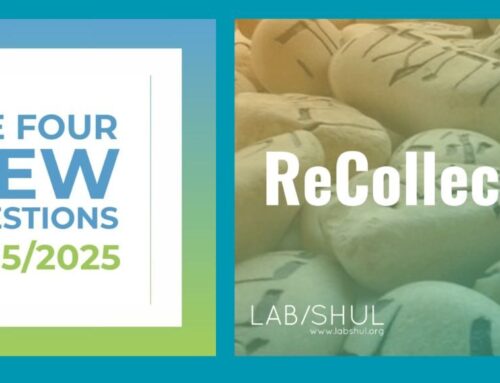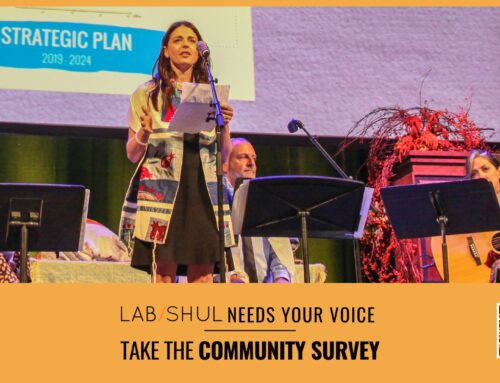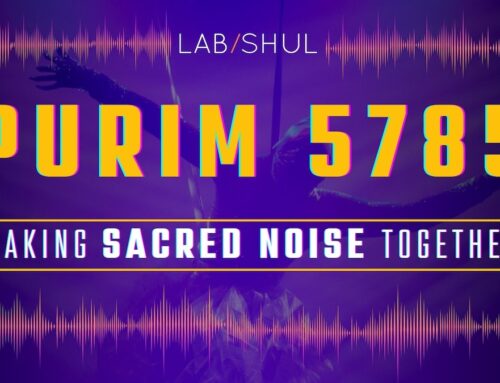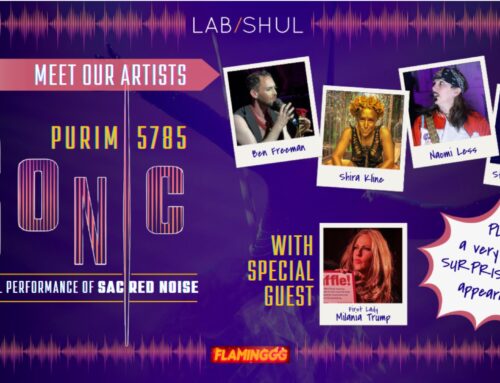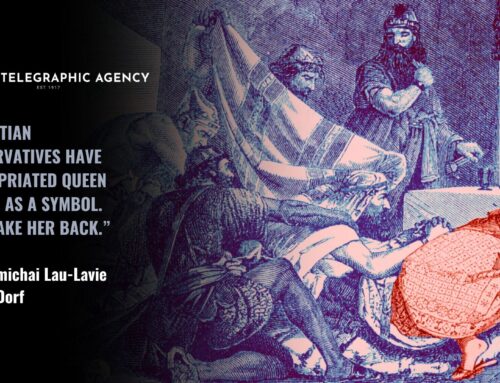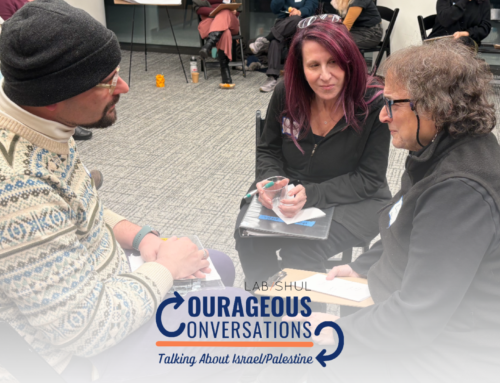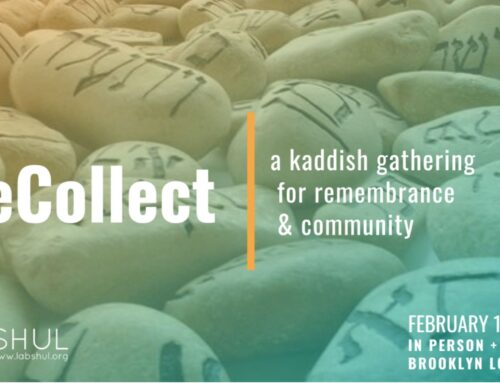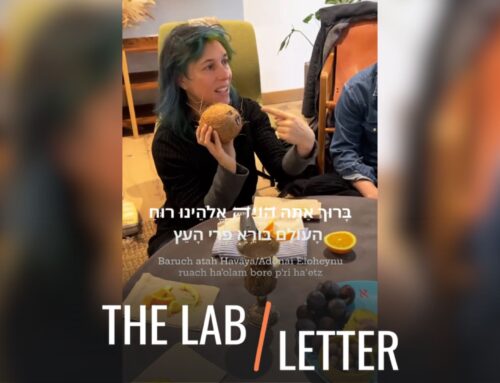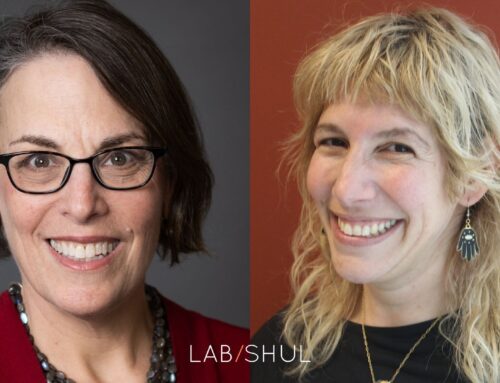


It’s 4am in Jerusalem, and I’m wide awake. Again. Outside my window frogs croak, the early birds respond, and from half a mile away the Muslim call for prayer swirls like smoke from the top of the sacred mountain where worship of some form of God has been happening for countless generations. Next I hear the rumbling of sanitation trucks through the still empty streets. Slowly, dawn rises.
“On my bed at night I seek what my soul yearns for…” – Fragments of biblical poetry from the Song of Songs, written right here thousands of years ago, echo through me, sleepless, restless, not just because of jet lag anymore. Layers of life bubble up here, always in process, like the fermented cabbage I just pickled in an organic farm outside the city, the jar now waiting on the windowsill, patiently bubbling.
I’ve been back here for a week, relieved to be reunited with my mother, family and friends, following the longest time I’ve ever been away. My last visit was in January 2020. The hugs are epic. I spent a full minute hugging my mother, with tender intention – that alone was worth the trip.
Beyond the joy – the decompression. There was a war here just two weeks ago, on the heels of the pandemic. Now everyone desperately wants to go back to normal. But what does that look or feel like? What can not be turned around?
So much that’s still unspoken: private anguish and collective dread, worries bleeding into dreams and keeping me awake at night. I’m not the only one, it seems. A few more people that I’ve spoken to, across the country, shared sleepless tales. Next time, just call me, my sister, who’s in Tel Aviv, suggests. She is not kidding – but I don’t. Instead, I sit and scribble as the night fades. Trying to process, to ferment – figment, fragments from what feels like fragmentation inside and out. Feels like something in process. Maybe it feels like hope.
Masks Off
Today in Israel the masks are off officially, along with other Covid regulations. June 1 marks the return to “normal.”But it isn’t just the Covid masks that have come off. The recent weeks of violence, particularly in Israel’s mixed Arab-Jewish cities have unmasked realities, revealing fears, and frowns and long held discord and discrimination.
I think of the tragic-comic masks of ancient theaters, and how both politics and public art become forums to proclaim trauma. Side by side, the tragic mask sits beside the comedic – as the trauma, the big wars and little fights, sits beside the attempts to justify and testify and clarify and rectify the hurting, and beside the unyielding human hope that there is another side, of peace, and children sleeping through the night.
It’s always been the public storytellers, mythic meaning makers who mediate the transformations of pain into the possible redemption. It is the role of stories – sacred scriptures, epic plays, bedtime fairy tales – to try and make sense of what simply does not add up? To make sense of the cycle in which we keep hurting ourselves and our neighbors again and again and again?
Beyond the screens and swipe-style memes that leave so little room for messy nuance – where are the “the ends” or the morals of the stories? With so many of our storytellers today masked by fear, or misunderstanding, or hurt – are we getting stuck in a stale myth, rather than finding a new ending for the story?
What happens when the masks are taken off and we really see each other? Globally we are experiencing a shift as we come out of over a year of pandemic and uncertainty. This moment is for vulnerability. For revealing what matters most, if only for a moment. Can we make this precious moment last, now that we’re unmasked?
The masks are everywhere, discarded. I saw some on the beach in Tel Aviv a couple days ago, like seashells, trash once precious. Less of them on the streets here in Jerusalem. If there’s one thing that Leon, the current mayor is doing well, I’m told by several people, is cleaning up the streets. He’s really really focused on sanitation. The city has cleaned up. West Jerusalem, anyway…I haven’t been to East Jerusalem yet. Maybe he can’t or won’t do much to really deal with the ferment of fury and continued occupied frustration and systemic improvements and so the city puts it all into the brigades of street cleaners and the trucks that rumble in the early hours. Maybe it’s a healthy start.
Today there’s news of a new coalition that looks like it can replace Netanyahu – finally. We can only hope this peculiar patchwork of ideologies, held together by disdain for a leader accused of corruption actually works. It may, it may not. It may take generations to unravel the harm woven into the fabric of this land in recent years. There is so much at stake for all of us. But once again – here’s hoping. A lot is in the hands of younger leaders, eager to listen, eager for change.
Maybe I’m up all hours because there is so much to process. So much to clean up when the masks are off and here I am again, back home. Wide awake, thinking of reconciliation.
Last night I was on a zoom call organized by The Sulha, the reconciliation project between Palestinians and Israelis, now in its 20th year – but newly on screens. In some ways, it’s easier, especially for some Palestinians who can’t get permits to meet with Israelis – but it’s also harder since many don’t have computers or strong enough WIFI.
About 80 people got on, from Hebron and Nablus, refugee camps and nearby cities, and from Tel Aviv to Beer Sheva. A tender, self-selecting group, some new, who keep showing up for hope and for and with each other. This was the first such meeting since the most recent surge of violence, and what’s on everyone’s minds is what will sustain hope when all around seems to be crumbling again, and worse.
Here are a few voices:
“I’ve seen this movie before”, says A., a tired woman from Ramallah talking about the recent back and forth of bombs and rockets. “we all have. It’s exhausting. I’m so tired all the time.”
“It’s not about the governments or the elections or some peace accord”, says S. a vibrant young Israeli activist who grew up in an Arab-Jewish community and was stunned to learn of how the rest of Israel lives. “It’s about what we are doing here – one by one by one – get to know each other. We don’t bomb people we know by name.”
In perfect Hebrew with a very slight accent, N., who lives in Tel Aviv, a successful Palestinian lawyer who has spent years in the US, describes her fear of stepping out into the streets during the recent days of violence, worried that if she speaks on the phone in either Arabic or Hebrew she’d be risking someone’s rage. She ended up choosing to self quarantine until the ceasefire was announced.
“Ridiculous”, she shrugged, and smiled. “But I’m glad to be back here, closer to the people that I love.”
F. who lives in a refugee camp outside Hebron, gets on the zoom with no video because he fears recognition and anger from his neighbors for “normalizing” Israelis. All he wants is to be seen as human – not an animal.
“Do I have empathy from Israelis?” he acknowledges the history of blame on both sides, and wants a better future for his children
D. an Israeli poet, somatic healer, and the kindest soul – who doesn’t watch any TV at all but has watched every season of Fauda, as a crazy way of dealing with his own memories of being a soldier in the Israeli Army 15 years ago, in active service.
“Everyone in this show is wrong and right” he says, “we are all intensely human, and maybe it’s my way of dealing with my PTSD and what it takes to live in this land that I love and don’t’ want to give up on.”
He gets a lot of nods, from all sides. It is, apparently, a very popular show for both Palestinians and Israelis. (I’ve never been able to watch it myself.)
It was a moving night of conversation, silence, some smiles and tears. Brave people who refuse to give up on the hope of making this place work, who have no other choice but keep on trying. Despair, someone said, is not an option.
Face to Face Shabbat
Nava Tehilah, One of the Jerusalem based congregations that holds ecstatic musical ritual gatherings that has inspired me for many years and is part of the Lab/Shul inspiration – met this past Friday, in person, for the first time in over a year.
It was incredible. We met outdoors, gathered in concentric circles – Jews of all types – a Reform rabbi sitting next to an Orthodox one, a group of nuns in habits, neighbors that have not seen each other face to face in many months, and a whole bunch of us from the US who just arrived. All were beaming.
A group of young local Palestinians were invited, and showed up. They were part of a joint Arab-Jewish startup initiative encouraging and supporting local projects that promote coexistence. I met a few of them at an event earlier last week and it’s hard to describe the joy of welcoming them, guests, together, at this loving prayer circle. At some point, we were invited to stand together, holding hands. There were many tears.
I met H. with whom I held hands and we smiled at each other, awkward yet moved. I translated the meaning of the prayer we were singing – welcoming angels of peace. Then we sat to talk. He is in his early 30’s, born in East Jerusalem and still lives here, working as a tour guide focused on introducing Israelis and foreign tourists to the realities of East Jerusalem and Palestine.
He speaks a good Hebrew, I was able to use a bit of my clumsy Arabic, but we mostly spoke in English. He told me he wants to learn Yiddish. Why Yiddish??? I asked. He wants to have a future in politics here and thinks that there will be a lot more ultra-orthodox Jews in Israel, and he wants to speak to them in Yiddish. Wow.
We started planning a night time tour led by him, for a small group of us – when a siren pierced the dusky Jerusalem sky. We were both startled for a second before realizing that it was not a siren of alarm, just the weekly reminder that Shabbat was about to begin. We both burst out laughing. H. taught me how to say Shabbat Shalom in Arabic. I taught him the Yiddish version. We hugged goodbye.
I went off to my family shabbat dinner, the first one since…
When will we stop counting the first’s?
PTSD
My family is gathered around the table at my brother’s home for Shabbat dinner – table cloth, challah, and all the usual. It’s a religious zionist crowd, including my nephew, who is a soldier in the IDF, just back from a month on the Gaza border.
Give me a highlight, I ask him. He hesitates for a moment, this quiet, bright 21 year-old kid whom I’ve known his whole life. Then he shared what it was like to be out on the border, for nights at a time, watching out for drones and experiencing, at least several times, rockets falling 100 or so feet away. “Everything shakes. My ears are still ringing,”he said. “And I’m not sleeping too well.”
The conversation around the table turned, of course, to recent events. “Did we move to the center or did the rest of our religious zionists move to the right?” my sister in-law wondered out loud.
One of the guests, a religious high school principal adjusted his skullcap and discusses his deep friendship with an Arab colleague in the city of Lud where recent violence rocked the fragile reality of Arab-Jewish living, and where, against the odds, he has been bringing his students several times a year for encounters with Arab students. The previous week, he told us, his colleague came to his school in Jerusalem, to share with the teachers and the students what has been happening on the ground.
I am surprised to learn of these relationships and conversations. The divides are wider in the tired Israeli society, with the turn to the right and the refusal by so many to face the facts – the occupation, the ongoing growing abuse of human rights just around the corner. But here, tonight, was empathy, concern – and a path beyond denial. There are, I think, I hope, more and more examples of attempts to bridge, to reckon. Perhaps too little, perhaps too late, and definitely not enough.
The conversation turns to the LGBTQ Pride March coming up this week in Jerusalem. I never heard my brother use the word “queer” before. Only a few years ago this would not have been a topic for discussion at this modern orthodox Shabbat table. But there I am, and here we were, with two more families seated at the table with close family members who are out of the closet. There’s been a shift in the past decade. My brother, a brave rabbi, had something to do with that. There’s still a long, long, way to go and Jewish law may move much too slowly for what some of us demand, but there is a shift, and with it, a reality check that defies and redefines who matters and how.
This too begins with empathy, responsibility, and with courage to change. Gotta have patience even if pride won’t always be polite. How else will big change happen?
I have been reading a book Healing Collective Trauma, written by Thomas Hubl, an Austrian now living in Tel Aviv. I find this passage after healing home that night:
“To feel the problems of our world is to know its suffering, but this requires compassionate ‘response-ability.’ If we fail to address the world’s collective trauma with clarity and compassion, we imperil the survival of our children and our children’s children – and countless other species.”
So, nu –no wonder I can’t fall asleep, or wake up hearing the call to prayer, and the frogs, and birds and the wind in the trees, rustling, like a reminder. This story is old, I know, but it goes on. Somehow, on this day that just begins, it feels a bit like fermentation, smells a bit like pickles, and like hope…

